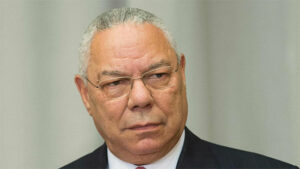Home » Commentary » Opinion » Powell a great soldier-statesman and also a realist
· The Australian

 Colin Powell was not only a great soldier-statesman. He also was a great man, one of the last surviving members of the George HW Bush administration’s foreign policy team that prosecuted America’s last military victory. The US is diminished as a nation by his death this week at 84.
Colin Powell was not only a great soldier-statesman. He also was a great man, one of the last surviving members of the George HW Bush administration’s foreign policy team that prosecuted America’s last military victory. The US is diminished as a nation by his death this week at 84.
The resume was outstanding. A Vietnam veteran who served 35 years in the US Army, Powell became a four-star general. He was Ronald Reagan’s national security adviser (1987-89), and chairman of the Joint Chiefs of Staff, the top military position in the US, under the first president Bush and Bill Clinton (1989-93).
Powell was the first African-American to hold these posts, and he often spoke about America’s progress on race. He had lived, after all, in a nation that in a single generation had moved from widespread segregation to a time when a black man became a leading figure in Washington’s corridors of power. Indeed, the Powell biography is a rebuke to those on today’s “woke” left who claim the US is a systemically racist nation.
As secretary of state under George W. Bush (2001-05), Powell was the third highest ranking official in the executive branch. And it should be stressed he was third only because he turned down the second spot (vice-presidency) in 2000 and he declined to run for the first (presidency) in 1995-96.
In foreign policy terms, Powell is best described as a conservative realist. In Vietnam, he learned first-hand some hard lessons: that any military mission should have a well-defined strategic objective, a realistic plan to win the peace and a clear exit strategy. Unlike many post-Cold War conservatives and liberals who championed a Pax Americana, Powell stressed an unsentimental focus on national interests, pursued with a prudent calculation of commitments and resources.
He was a strong proponent of deterrence, which he believed was to limit recourse to the actual use of force. (He once said he thought he’d have an aneurysm after Madeleine Albright asked him during a 1993 debate over US intervention in Bosnia: “What is the point of having this superb military that you’re always talking about if we can’t use it?”)
As the leading US military figure following Iraq’s invasion of Kuwait in 1990, Powell wisely recommended a limited and reactive war: he foresaw that marching into Baghdad to topple Saddam Hussein would plunge the US into the kind of morass that later engulfed America and its allies in Iraq after 2003. As a believer in the Pottery Barn principle – “You break it, you own it” – Powell knew regime change would amount to the US owning Iraq and all of its internal problems.
That is why Powell advocated prudence in the lead-up to the 2003 Iraq invasion. He favoured exhausting all diplomatic options in the hope the Iraqi tyrant could be contained and disarmed without war and, if not, that Bush go to the UN for a resolution of support on Iraq. His lowest moment came in February 2003 when he made the case to the UN Security Council that Iraq possessed weapons of mass destruction that later were never found. The episode masked what most people suspected: that the second Iraq war was not a mission Powell, with his realist belief in risk-averse engagements, really supported.
Powell lost the battle of ideas to vice-president Dick Cheney, defence secretary Donald Rumsfeld and the neo-conservatives who embraced a radical, pre-emptive and open-ended war that was ultimately a badly executed exercise to transform not only a nation but also a region. Powell’s instincts were right: Iraq cost the US dearly in blood, treasure, credibility and prestige.
As distinguished historian Walter Isaacson has written: “The lesson we should remember about (Powell) is not that he failed to prevail, but that he should have prevailed.”
Powell had liked to think of himself as a loyal soldier who dutifully tried to carry out his president’s policies. But behind the scenes he was out of step with the unilateralist and muscular Wilsonian impulses that had driven Bush’s foreign policy agenda after the September 11 terror attacks.
Powell was motivated by service to his country and by duty to his fellow citizens. Not only does his death deny the US of one of the most impressive soldier-statesmen of the modern era. It also reminds us of how things have changed – how we now live in an age where political leaders are increasingly shallow and self-serving. Indeed, they are pygmies in comparison with Powell.
Powell a great soldier-statesman and also a realist